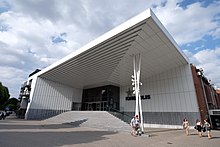The Kinepolis Group is a Belgian cinema chain with 110 theaters in Europe and North America. It is Europe’s third-largest cinema chain.
 | |
 Kinepolis in Gent | |
| Company type | Public (NV) |
|---|---|
| Euronext Brussels: KIN | |
| Industry | Cinema, film distribution |
| Founded | 1997 |
| Headquarters | |
Key people | Eddy Duquenne (CEO) Joost Bert (Chairman) Philip Ghekiere (Vice-Chairman) |
Number of employees | 4,600 [1] |
| Subsidiaries | Landmark Cinemas |
| Website | www |
History
editThe Kinepolis Group is a Belgian cinema chain formed in 1997 as a result of the merger of two family cinema groups, Bert and Claeys, and has been listed on the stock exchange since 1998.
The first megaplex cinema in the world is considered to be Kinepolis Brussels located near the Atomium in Brussels, Belgium, which opened in 1988 with 25 screens and 7,600 seats.[2][3][4][5][6][7][8][9][10]
On 17 September 1998, the world's largest cinema megaplex, Kinepolis Madrid Ciudad de la Imagen, opened in Spain, with 25 screens and 9,200 seating capacity, with each seating between 211 and 996 people.[11][12][13]
In 2006, the Claeys family withdrew from the venture, selling most of its 25% stake of shares in the company[14] and transferring daily management to Joost Bert, who, since 2008, shares the position of CEO with Eddy Duquenne.[15]
Competition authority
editThe Belgian competition authority approved the merger of the company in 1997 on the condition that the company wasn't allowed to grow within Belgium without explicit consent of the authority. This resulted in the resale of the acquired Utopolis cinemas in 2015. Kinepolis tried on several occasions to get the authority to lift the ban, and they succeeded in 2020. From August 2021 the company doesn't need permission to open new locations within Belgium.
Growth and acquisitions
editKinepolis grew significantly in recent years by opening several new locations, but also by acquiring chains and independent cinemas. Significant acquisitions were Wolff Bioscopen in 2014, Utopolis in 2015, Landmark Cinemas in 2017 and MJR Digital Cinemas in 2019.
In 2011 the company also acquired Brightfish, a Belgian company specialised in cinema advertising.[citation needed]
Core businesses
editThe Kinepolis Group consists of seven core businesses; box office, in-theater sales (ITS), business-to-business (B2B), film distribution, screen advertising, real estate, and digital cinema services.[16]
References
edit- ^ "Kinepolis Group Annual Report 2019" (PDF). corporate.kinepolis.com. Retrieved 2020-04-26.
- ^ Acland, Charles R. (2003). Screen Traffic: Movies, Multiplexes, and Global Culture. p. 136. ISBN 978-0822331636.
- ^ John Tagliabue (January 27, 2000). "Now Playing Europe: Invasion of the Multiplex; With Subplots on Pride and Environment". The New York Times. Retrieved November 17, 2009.
- ^ Edmunds, Marlene (June 15, 1998). "Kinepolis Keeps the Plexes Coming". Variety. p. 74.
- ^ "Kinepolis Brussels in Brussels, BE". Cinema Treasures.
- ^ Kinepolis (16 November 2016). "Kinepolis re-opens IMAX theatre in Brussels". GlobeNewswire (Press release). Retrieved 28 January 2023.
- ^ "Belgium's Kinepolis Takes The Megaplex On The Road". Bloomberg.com. 1997-10-06. Retrieved 2023-04-14.
- ^ itinari (2020) Visit Kinepolis Brussels [Accessed 25 Dec. 2021].
- ^ DestiMap.com. "Kinepolis Brussels, Brussels". DestiMap. Retrieved 2023-04-14.
- ^ "Mega-ambitious". Forbes. Retrieved 2023-04-14.
- ^ Watts, Christopher. "Mega-ambitious". forbes.com. Retrieved 5 April 2018.
- ^ Bennett, Laura (20 June 2010). "Moviegoing in the land of Almodóvar". Boston.com. Retrieved 5 April 2018 – via The Boston Globe.
- ^ "Fabulous Fifteen - Film Journal International". www.filmjournal.com. Retrieved 5 April 2018.
- ^ "Kinepolis families head for divorce". Expatica.com. Retrieved 2018-04-30.
- ^ "History of the Group | Kinepolis Group". corporate.kinepolis.com. Retrieved 2018-04-30.
- ^ "Kinepolis core business". www.kinepolis.com. Retrieved 8 November 2012.